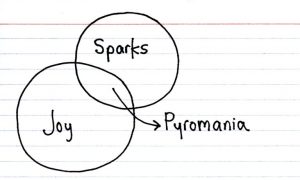Wisdom for Your Weekend is your regular installment of what we’ve been reading (and watching) around the web. Presented to you by Chris Pappalardo, with guidance from Pastor J.D., this is our attempt to reflect Proverbs 9:9: “Give instruction to a wise man, and he will be still wiser; teach a righteous man, and he will increase in learning.” While we do not always agree with everything these authors post, we share these resources because we find them challenging and enriching. As we often say around the Summit, when it comes to reading, “Eat the fish and spit out the bones.”
Articles of the Week
Does She Spark Joy? Sorting Through Marie Kondo, Rachel Gilson. Until about five weeks ago, I had never heard of Marie Kondo. But since Christmas, I can’t seem to escape her. A family member gave me her book. Netflix continually reminds me that everyone else is watching her show. And no fewer than 10 people have asked me what I think about her philosophy of tidying up—which she calls “sparking joy.” Gilson’s article provides an insightful response, exploring why the Kondo method is appealing while also revealing how the Kondo method still leaves us wanting.
We Are All Equally Sinful. We Are Not All Equally Broken … or Toxic. Brad Hambrick. This is an incredibly important distinction, and ignoring it can lead to disaster. While it is true that all of us stand before God guilty of sin—the ground is level at the foot of the cross—it is not true that we should approach every sin or struggle in the same way. When the fallenness of this world hits people in acute ways, many of us are prone to minimize the problem. Let the wisdom of Pastor Brad show you a better way.
The State of the Pro-Life Movement Today, Scott Klusendorf. “Instead of arguing at a fever pitch, Christian students can be taught to ask thoughtful questions aimed at giving people something to think about. Two of my favorites are, ‘Do you believe that each and every human being has an equal right to life, or do only some have it based on something none of us share equally?’ and, ‘If it’s wrong to hurt people because of skin color or gender, why is it okay to hurt them because they are smaller, less developed, or in a different location?’ The goal of asking is not dominance but thoughtful engagement.”
You Don’t Have to Have a Well-formed Opinion on Everything, Trevin Wax. I was just teaching some of our Summit apprentices this very thing last week. We all sense the pressure to keep up with current events—not only knowing what has happened but having a quick response to what has happened. Hot takes reign. But this pressure is neither biblical nor sane. To influence our culture well, the best path to follow is that of wisdom and humility. And sometimes humility says, “I don’t know what to think about that yet.” Ironically, the less we clamor to express our views on every current controversy, the more likely we’ll have something worthwhile to say (if we so choose) when the next current event explodes onto the scene.
Four Reasons Survivors of Abuse Stay Silent, Anonymous. If you have been abused, you probably know these reasons too well. If you have not, you may be surprised to learn what fears and confusions are keeping your friends from reporting their abuse. Those of us in the church must do everything we can to remove these obstacles, creating an environment in which survivors of abuse feel safe enough to speak up. It starts with two simple statements: “I’m sorry” and “I believe you.”
On the Lighter Side
Another Take on “Sparking Joy,” Jessica Hagy. A slightly less profound—but potentially more pragmatic—reflection on the Kondo method:



